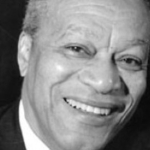Old now,
your eyes nearly blank
from plotting the light's
movement over the years,
you clean your Almanac
and place it next
to the heart of this letter.
I have you in mind,
giving a final brush and twist
to the difficult pages,
staring down the shape of the numbers
as though you would find a flaw
in their forms.
Solid, these calculations
verify your body on God's earth.
At night,
the stars submit themselves
to the remembered way you turn them;
the moon gloats under your attention.
I, who know so little of stars,
whose only acquaintance with the moon
is to read a myth, or to listen
to the surge
of songs the women know,
sit in your marvelous reading
of all movement,
of all relations.
So you look into what we see
yet cannot see,
and shape and take a language
to give form to one or the other,
believing no form will escape,
no movement appear, nor stop,
without explanation,
believing no reason is only reason,
nor without reason.
I read all of this into your task,
all of this into the uneasy
reproof of your letter.
Surely, there must be a flaw.
These perfect calculations fall apart.
There are silences
that no perfect number can retrieve,
omissions no perfect line could catch.
How could a man but challenge God's
impartial distributions?
How could a man sit among
the free and ordered movements
of stars, and waters, beasts and birds,
each movement seen or accounted for,
and not know god jealous,
and not know that he himself must be?
So you go over the pages again,
looking for the one thing
that will not reveal itself,
judging what you have received,
what you have shaped,
believing it cannot be strange
to the man you address.
But you are strange to him
—your skin, your tongue,
the movement of your body,
even your mysterious ways with stars.
You argue here with the man and God,
and know that no man can be right,
and know that no God will argue right.
Your letter turns on what the man knows,
on what God, you think, would have us know.
All stars will forever move under your gaze,
truthfully, leading you from line to line,
from number to number, from truth to truth,
while the man will read your soul's desire,
searcher, searching yourself,
losing the relations.

















Comment form: